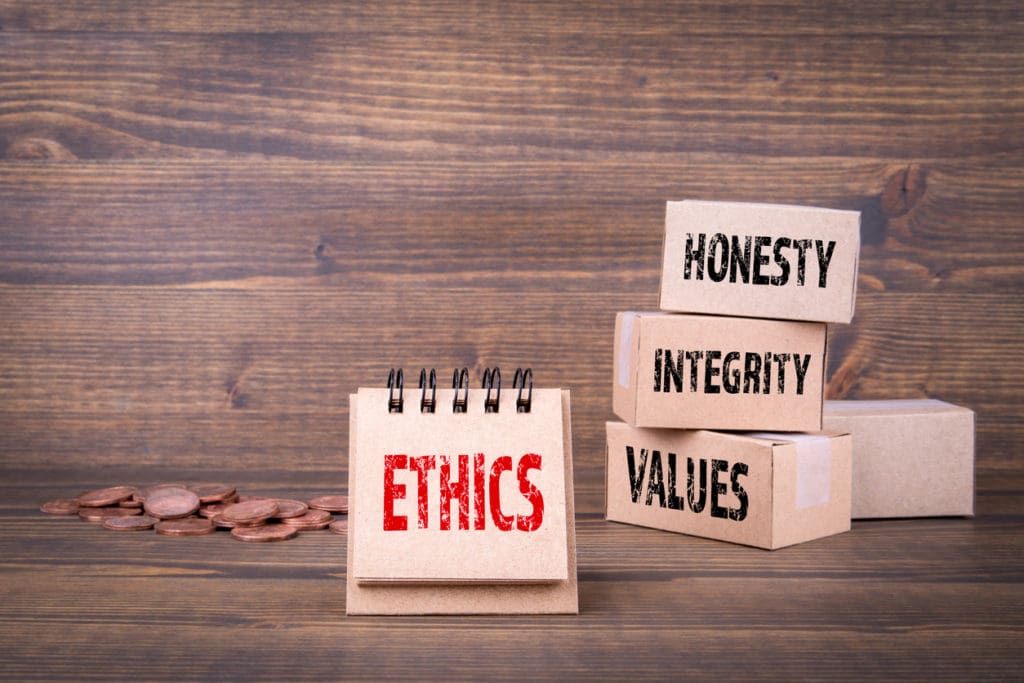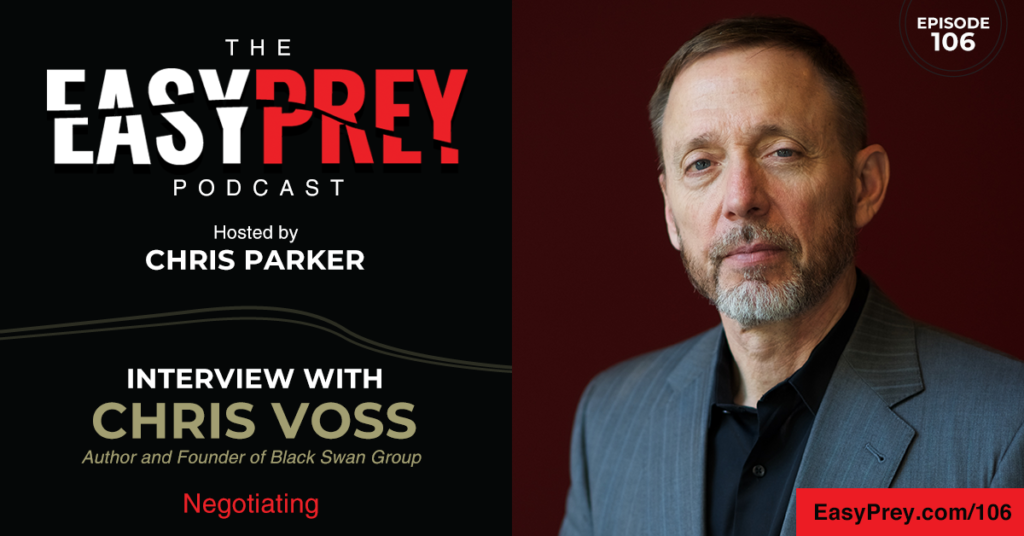
Negotiating doesn’t just take place in hostage situations or in big board rooms. You can end up in conversations exchanging the commodity of your time without even realizing you are in a negotiation. Listen on to learn how to be more aware of these interactions.
Today’s guest is Chris Voss. During Chris’s 24 years of FBI experience, he was trained in the art of negotiation not only by the FBI but by Scotland Yard and Harvard Business School. He is the former FBI Lead International Kidnapping Negotiator. Chris is the author of the negotiating bestseller Never Split the Difference and is the founder and CEO of The Black Swan Group. Chris has taught business negotiation in the MBA programs and has been an adjunct professor at numerous schools of business. He has used his many years of experience to develop a unique program and team that applies these globally proven techniques to the business world.
“Fear of loss is a big thing.” - Chris Voss Share on XShow Notes:

- [1:20] – Chris Voss shares his background and how he got into understanding negotiation skills.
- [2:38] – In his book, Chris presents strategies in specific actionable language.
- [4:20] – There are times when you are negotiating and you don’t know it.
- [6:22] – We often think that negotiations always include money, but time and implementation are also commodities.
- [7:16] – The second you want something, you are in a negotiation.
- [8:11] – Chris explains the results of experimenting with changing the yes questions to no questions.
- [10:08] – The skills in The Black Swan Method are neutral.
- [12:50] – If you have a bad feeling, proceed with caution. The more you question, the stronger your instinct will be.
- [14:31] – Chris Voss describes The Black Swan Method and its solid foundation of skills.
- [16:20] – Your gut instinct is probably pretty good. Listen to your feelings and think about using the skills to test your gut instinct.
- [18:30] – Your subconscious can process much more than your conscious mind.
- [20:30] – Chris Voss demonstrates how anger impacts your decisions.
- [22:05] – Strategic umbridge is when someone purposefully makes another person angry during negotiation.
- [25:01] – Dynamic silence is an appropriate response to bringing another’s emotions back down.
- [28:20] – Decision fatigue is something that needs to be factored into negotiation.
- [29:57] – What is the science behind responding to no-oriented questions?
- [32:32] – There is a better solution than splitting the difference.
- [35:02] – What is the craziest negotiation Chris was involved in?
- [36:01] – 20% of the business deals presented are fake opportunities.
- [38:57] – It is more impactful and profitable to have a relationship.
- [40:11] – Chris Voss describes an impossible to fulfill request in a hostage situation in the early 2000s.
- [41:01] – Stop using the term “pick your brain” when asking for something.
- [42:06] – It is important to show empathy.
Thanks for joining us on Easy Prey. Be sure to subscribe to our podcast on iTunes and leave a nice review.
Links and Resources:
- Podcast Web Page
- Facebook Page
- whatismyipaddress.com
- Easy Prey on Instagram
- Easy Prey on Twitter
- Easy Prey on LinkedIn
- Easy Prey on YouTube
- Easy Prey on Pinterest
- Black Swan Website
- Chris Voss on Twitter
- Never Split the Difference: Negotiating as if Your Life Depended On It by Chris Voss
Transcript:
Chris, thank you for coming on the Easy Prey Podcast.
Yeah, Chris. It's my pleasure.
This is going to make it difficult for transcription—Chris and Chris having a conversation. Can you tell the audience a little bit about your background and how you got into negotiating?
Yeah, a former FBI hostage negotiator. I started teaching hostage tactics in negotiation in business schools and they worked really well. It turns out they're just emotional intelligence approaches, and believe it or not, all people make decisions based on the same basic things, regardless of the circumstance. How does this affect you as a human being? What's at stake? Fear of loss is the big thing.
Believe it or not, all people make decisions based on the same basic things, regardless of the circumstance. -Chris Voss Share on XNobel behavioral economics prize winner Daniel Kahneman in 2002 said fear of loss “stings twice as much as an equivalent gain,” which basically makes it the biggest impact on your thinking. We didn't know that in a hostage negotiation, we’re just taught to look for it, […] for it, and deactivate it. It turns out to work for everything. I was a SWAT guy, I became a negotiator, I finally retired from the FBI, and here I am.
Was it just the desire to tell the stories of what you've gone through for your book? Or were you trying to kind of, “How do I flip this and teach it to business people and just in day-to-day lives”?
The good stories are really kind of a secondary benefit of the book. It's really actionable, easy-to-absorb advice. It makes a lot of sense. Some of the academic books that are out there are so cerebral that you're like, “All right, so this makes sense to me; I just don't know what to do with it.” We tell you specifically what to say, try it out, and find out what's going on.

My teaching experience really began as an FBI hostage negotiator; we taught it to local law enforcement. That's the tough crap. They're not interested in academics, you figured out based on my multi-syllable jargon in philosophy.
I don't want people testing stuff in a negotiation circumstance. “Let’s see if this works.”
Yeah, even if it does, teaching cops is like playing the Apollo: you better be good or you're going to get booed off the stage. They're very practical people. They’ve got problems they have to deal with right now. With that approach to teaching, my son and I got the whole Black Swan method together and started rolling it out of business schools.
The students liked it because they had real problems they wanted help with right now. One of the biggest things about the book is it's really actionable and easy to learn. Some of the stuff is counterintuitive, which means it's going to scare you. Then getting out of your own way is one of the problems.
I wonder, are there situations where we are negotiating and we don't realize it? Just day-to-day life situations where we don't think of it as a negotiation but the other person might be.
The most dangerous negotiation is the one you don't know you're in. -Chris Voss Share on XYeah, the most dangerous negotiation is the one you don't know you're in. If the words I want or I need are either coming across your lips, in your mind, if they're coming across the lips of the other person or in their mind, you're in a negotiation. I mean, you really are. The commodity that's always at stake in negotiations is time.
People think, “Well, it's only a negotiation if I get dollars in mind.” Timing, and really what people miss is implementation. One of my favorite examples is, “Are you in a negotiation with Starbucks?” Black Swan team would say, “Yeah.” Now, what makes us say this?
The commodity that's always at stake in negotiations is time. -Chris Voss Share on XA couple of years ago, I met a guy who started this website global phenomenon called Secrets, because I'm talking about hidden negotiations. He says, “Hey, I’ve got something to tell you.” The Secrets concept is send me your secrets anonymously; I'll share them with the world. Other people are struggling with the same thing you are, it's going to help them to know that you're in the same boat; you’re not by yourself.
He says, “I get a brand new, still-in-a-wrapper Starbucks coffee cup sent to me with a note that says, “I give decaf to people who are mean to me.” That negotiation was about implementation—what you ask for and what you get are two different things, depending upon how you ask for it. You're in a negotiation over the implementation.
Since I've shared that story, the number of waiters and waitresses have told me, “Yeah, I’ve got to tell you, somebody comes to us for dinner and there are customers that are kind of rude. If they ask for decaf at the end of the night, we give them caffeinated coffee.” Implementation is everywhere. That's the negotiation.
To me, I think the first thing that we always think of with negotiation is money if there's a transactional element. I'm going to buy a car, I'm going to sell a car, I'm going to buy some furniture and we don't think of implementation. We don't think of time as much as we do what's in our wallet.
Yeah, time’s a commodity. If time is involved, which you’ve got to do something, somebody else has to do something, even if it's a negotiation, there's a negotiation for your attention. As soon as you begin to become aware of that and then embrace it, it's like gravity. You can either embrace it or ignore it, but you're going to get pounded by gravity one way or the other.
The real cross is the threshold from sales to negotiations. I said this a million times before I finally heard what I was saying myself: sales is somebody is trying to get you to think, “I want.” And as soon as you think that, you're in a negotiation. “I want a cup of coffee.” “I want a new car.” “I want a Kindle” or whatever it is, you're in a negotiation.

I know with the sales process, they always talk about micro-commitments and little yeses to build up this chain of yeses that for somehow—
That's horrible, by the way.
I see salespeople do it to me and I'm like, “Oh, it just creeps me out when people do it. I'm not going to drop $20,000 on something just because I said yes 40 times.”
Right, exactly.
Is there a comparative in negotiation or an opposite?
Yeah, one of the things that we discovered—and it's one of the craziest things that we stumbled over—but getting somebody to say no instead of yes completely changes the dynamic. We'll say, “Instead of, ‘Do you agree?’ We say, ‘Do you disagree?’” Instead of, “Do you want to do this?” We say, “Are you against?” “Have you given up on?” We changed literally every single yes question to a no question.
What happens when you do that? What’s the advantage? People have been conditioned to feel that when they say no, they feel protected. Consequently, they're more able to evaluate options, regardless. I might say, “Look, do you disagree?” And I'll say, “No, I don't disagree, but here are the following things that I need.”
Because they said no, they feel they can lay this stuff out for me and none of those things are micro-commitments. Now, if I say, “Do you agree?” And you say, “Yes, but here are the following things I want,” there's a feeling that every yes is a micro commitment and you get into this creeped out feeling that you were talking about just now.
“I ain't ready to commit. I got no problem telling you what I need to commit.” But even if I say what I need, I want to reserve the option to still not commit. It becomes a much more open conversation when the other person doesn't feel like every yes has got a fish hook buried in it.
It becomes a much more open conversation when the other person doesn't feel like every yes has got a fish hook buried in it. -Chris Voss Share on XIs it that the no gives them a feeling of, “I have power; I'm not being pushed into this”?
Yeah, it does. It absolutely does 1000%, and it makes all the difference in the world.
Are there other techniques that get used to railroad people that we should be watching out for?
It's interesting that a no-oriented question comes up because each one of those skills in a Black Swan method is powerful and neutral, which means they're really in the hands of the beholder. It's like a scalpel. A scalpel in a doctor's hands saves your life. A scalpel in a serial killer's hands does the opposite.
What I'm seeing on a regular basis—and you were asking me before if people are getting flimflammed, getting bamboozled. Somebody can use a no-oriented question inappropriately. What do I mean by that? One of the most powerful ones is, “Have you given up on X?” It's great for when somebody's ghosting you—they’re not getting back to you, the dynamic.
You've been in communication. There is something there for them to give up on. It's a great way to restart communications. You've got to follow up with summarizing their perspective afterward; there's a very specific follow-on. But I get an email from somebody says, “Have you given up on doing business with me?” Since I never started, I couldn't have given up.
I already know this guy or gal, but it's usually a guy who has come across the power of no-oriented questions and is using them against people. I'll either immediately delete that email, or occasionally, I like to educate myself. I already know this person is what we would call hard, annoying, lame, and frustrating, so my guard's up. I want to confirm my gut instinct, so I'll proceed just to test my hypothesis.
I haven't been let down yet by somebody hitting me with that question at the wrong time. I got another one, an email, and I'm trying to educate the guy. I got an email today. He's using the how question. How question, in context, is a great question. He's like, “How do you feel about going on a Zoom call? How does that sound to you?” I responded back, “That sounds painful.”
I bet he doesn't hear that very often.
No, he doesn't hear that very often because he's learned the power of a how to question, but I've been in business long enough to know if I walk into a Zoom meeting in person, if we can't set a clear agenda in advance, we're wasting our time. I don't want to do a meeting or a Zoom call that's a brainstorming session, which means you want to pick my brain, you want me to tell you strategy, you're not really bringing any strategy to the table.
I sniff this out on a regular basis. I encourage everybody on my team to sniff this out. If you're getting a bad feeling from the other side, proceed with caution—proceed, and with caution—because you want to confirm whether or not your bad feeling is appropriate. The more you do that, the greater your instinct is because, in point of fact, it's my view that you could blindly trust 70% of the people that you interact with. I get some rough data that backs that up—experiential data.

The 30%, if they get their hooks into you deeply enough, they'll either sting you so emotionally that you don't want to do it ever again, or they might get their hooks into you financially. There's an old African proverb, I believe, that says, “Someone bitten by a snake is not afraid of ropes.” Your fear is actually hurting, so that's why proceed with caution. Look for testing behavior, figure out how you're going to use a Black Swan method to test the other side. Look for confirming data and then be willing to walk away.
Let's talk a little bit about the Black Swan method and what that entails, and then let's talk about how to see when negotiating tactics are being misused or used to manipulate people.
OK. Where do we start?
Let's start with the Black Swan method because then we'll have some ideas of what you talk about and what you teach, and then we'll come back to what we know is being manipulated.
Yeah, sure. The Black Swan method starts with just a basic set of skills, of which 75% of the basic skill set was specifically derived from the emotional intelligence of hostage negotiation skills. What makes that a solid foundation? What makes it a solid foundation is those skills are the same set of skills that every hostage negotiation team on earth uses.
This emotional intelligence battle-tested set of skills is cross-culture because the culture is human nature. Hostage negotiators in Tel Aviv, Bogota, Colombia, Tokyo, Japan, and Cape Town, South Africa all use the same basic skills. How do I know? I worked with all these people. We cross-train.
It starts from the skill set that we know works across the board. A Black Swan method has been adapted and elevated since we brought it out of hostage negotiation. Then we put a series of how to implement the skills together with a couple of different strategies and refined it. We learned a lot about the skills since we've been refining them.
You get a basic set of skills and then we've got a set of core strategies for the use of the skills, either by themselves or in combination. You start rolling with this stuff and the world changes, I mean, the world changes. That's the short one on the Black Swan method.
Awesome. How do we know when someone's manipulating and abusing, so to speak, negotiation tactics on us?
Your gut instinct is probably pretty good. A lot of this is simply listening to your gut and then, “How do I use the skills to test a hypothesis or gut feeling that I’ve got?” Your gut instincts are remarkably powerful. You've got a supercomputer, every one of us.
Your gut instincts are remarkably powerful. You've got a supercomputer, every one of us. -Chris Voss Share on XSome people call it the subconscious, some people call it the unconscious. Psychologists can't make up their minds which one to call it. I just know I'm being corrected by both. Your gut instinct, the unconscious, and the source of my data for this stat is The Biology of Belief. I want to say Thomas Lippman is the author, but I could be wrong on that because there are a couple of books that I really love about neuroscience and instinct that I quote all the time.
Anyway, Biology of Belief. Let's go with the conscious mind first. Whatever a bit of information, let's call it a syllable. The word one might be a bit of information. Your conscious mind can process 40 bits per second. Your subconscious, before I give you the answer, I would ask anybody listening to this to make a wild guess on what your subconscious can process versus the conscious mind's 40.
I'm going to guess 100 times.
That's generous and you're on the right track.
Am I falling short or underestimating?
Twenty million bits per second, 500,000 times. People find that astonishing. I'm not astonished by it at all because I'm blown away by the computing power of the human brain. That's where your gut instinct comes from.
Suddenly, you got a bad feeling. Now you refine your gut instinct by testing your hypothesis over and over and over again, and then your supercomputer gets better every time. You got to test it out, so you get a bad feeling from the other side. How do I test it out? It would be like a Black Swan skill—you think somebody's lying to you.

How do you test out a liar? Because liars, as a problem, are also the same type of problem with someone who hasn't thought things through, hasn't considered implementation. They can't answer questions about, “How do we move forward? How do you want to proceed? What's ahead of us? How do we accomplish these goals?”
A liar who is trying to hoodwink you is not going to have answers to those questions because their view preceding does not match yours, which is one of the reasons why in a Black Swan method, we actually don't really, per se, study how do you detect lies. Because the person who hasn't thought things through presents you with the exact same implementation problem, but they're not lying.
You run into the same downstream problem with two completely different animals—you get great at detecting deception, you walk right into the same problem with someone who just hasn't thought things through. Hence, I got a cold proposal: “Hey, I got an idea. I want to know if this person has thought things through.
How do you want to proceed? Come up with a concrete answer for me. I'm going to assume that your heart's in the right place. But if you haven't thought things through, you're wasting my time just like a liar would be wasting my time.
Easier to detect whether or not the person has thought things through than to figure out whether they're lying. You might as well just work from the easier assumption.
If somebody's lying to you, it's going to trigger your negative emotions, your amygdala. You're dumber when you're mad. -Chris Voss Share on XYeah. If somebody's lying to you, it's going to trigger your negative emotions, your amygdala. You're dumber when you're mad. Here's what makes me say that. Shawn Achor, a great Harvard psychologist that his phenomenal TED Talk, I think, is called The Happiness Advantage. One of the funniest TED Talks you'll ever hear. Shawn Achor is worth watching, plus it’s, like, 12 minutes.
Shawn says you're 31% smarter in a positive frame of mind. If that's true—and I'm willing to accept that it is—then by definition, that means when you're in a negative frame of mind, you're dumber. The double-whammy from a negative mindset is you're more convinced you're right. Self-righteousness usually comes from angry self-righteousness. You get this double-whammy when you're in a negative frame of mind that you're probably wrong and you're probably even more convinced that you're right because you're feeling self-righteous.
Your amygdala gets triggered if you think somebody's lying to you. My amygdala gets triggered if I think that somebody's lying to me. It doesn't help my thought process. I got to kick myself back into a curious frame of mind, which is positive and makes me smarter.
Would it be like if someone's trying to trigger you to get mad or angry? Is that an abused negotiation tactic in the sense that you're trying to force the other person to be dumber like getting him upset?
People who do that don't know that they're making the other side dumber. It's actually called strategic umbrage, and there are studies—flawed studies, and I can tell you why I think they're flawed—that says that strategic umbrage works. That the data collection, the data set is too artificial.
Strategic umbrage will get you what you want short-term and your losses long-term far outweigh the short-term gains. That's one of the problems with the study. There's no measurement of downstream costs and host-agreement costs. But there's an old saying out there, “Revenge is a dish best served cold.” That should tell you how badly people you've wanted to injure want to pay you back.
You talked about getting mad and feeling angry. Are there techniques to keep yourself from getting triggered about things that might get you going down that path?
That's a great question and a situational, contextual. It's impossible to be angry and be curious simultaneously. One of the guys on my team, Derek Gaunt, is a brilliant negotiation coach. His mantra is, “Stay curious, stay curious, stay curious.” You can't be angry and curious at the same time. You're smarter when you're actually curious.
You can't be angry and curious at the same time. You're smarter when you're actually curious. -Chris Voss Share on XIf you could ask yourself, “I wonder what's driving that? What's behind that?” That's a curious approach. One hard to do once you've been triggered? For me, personally, once I've been triggered, because of practice, I'll lapse into what we've referred to in the Black Swan method as the late-night FM DJ voice. Because if I've been triggered, the other person has probably been triggered too.
I'm using a voice to deactivate them, to take the wind out of their sails, but it also deactivates me. I can watch myself in a moment. If I use the late-night FM DJ voice, I get myself back under control.
That's interesting. It works for both you and the other person.
Exactly. It's a pretty much hardwired neurological response because I hear my voice as well as the other person, so it kind of works on me twice. For me to even tee it up in my head has a tendency to center me.
Are there other techniques of when someone's upset to de-escalate them and bring them down other than the late-night FM voice?

Dynamic silence, dead silence is often an appropriate response. Some people call it venting. We even have one of our blocks of instruction that we call CAVIAR. The V in CAVIAR is venting, which is really the appropriate use of silence, the response on the other side. That's going to be driven by your relationship with the other person.
Usually, the longer the relationship, the more effective dynamic silence can be. Just going dead silence, somebody who's really close to me. If they're blowing they're stuck at me, a long-term personal or professional relationship, my first best move is probably just to go dead silent and see if my lack of reaction will have a positive impact on them.
Kind of gets them to have that space to take a breath and not blow up.
Right, yeah. It's like a flip-of-a-coin move. Sometimes the anger can be a downward spiral in and of itself. Again, the longer the relationship, probably the more effective dynamic silence is. But then again, it's practice. Small stakes practice for high stakes results. You got to test drive the skills, you just have to.
Is that easy for people to learn to start practicing these skills outside of the intentional negotiation components?
The threshold can be really hard to get over. It depends upon how open you are to coaching, how open you are to trying stuff out. People really get up in their heads with a new skill that's just completely counterintuitive. The opportunities to try this stuff out every day are everywhere. Especially now that we're coming out of the pandemic, there's a lot more interaction. The clerk in a grocery store, the checkout person in the drugstore, a person in UPS. I just came from UPS. I got a local UPS that I'm going to constantly mail stuff out from.
I'll take a shot with one of the skills just to see if I can positively affect their mood. The interesting thing is if it's a new skill that you've never tried before and you're getting ready to try it but you're scared, try it four times. It takes a lot longer than that to hardwire. But if you've never tried it before, you need some real experiential data to back it up.
What I'm seeing on a regular basis is, if you just test drive this baby four times or whatever it is, you could try it four times, now you've got some experiential data to feed your subconscious to be able to make decisions on how you want to proceed with the skills.
You talk about decisions. I know, often in business coaching and whatnot, they talk about decision fatigue that—let’s make up a number—you’ve only got 400 decisions. Whether they're big or small, you only have a finite amount of decisions you can make in a given period of time in a day while you're awake. Does that give me the upper hand or the disadvantage in negotiating if it's in the morning or in the afternoon after a long day?

That's a great question. There are two things there that I’d like to point out. What we found is that no matter how tired you are, you can respond positively to a no-oriented question. With all of our clients across the board and even with me. Probably about five years ago, we had an intern. A young man was just horrified at making a mistake—horrified.
He'd always ask me, “How to do this, what do you want me to do, how do you want to proceed?” I found that because of decision fatigue if he asked me anytime after 1:00 PM, it wore me out to answer. I'd just be like, “I don't know; stop bothering me.”
Finally, I said to him, “Here's a blanket rule: any question that you ask me after 1:00 PM, it's got to be a no-oriented question.” Because what I'm finding regularly instead of saying, “What do you want me to do next?” He might say, “I'm thinking of doing this next,” and it'd be like, “No, do this, this, and this.” I could hit him with responses quickly no matter how tired I was.
Is it that your mind just works differently with the no-oriented questions?
I wish I could tell you for sure, I just know it does. Personally, I'm looking for brain science. I'm a massive fan of one of the guys out there right now. Andrew Huberman is, like, the cutting edge on brain science and neurobiology. I listen to his podcast constantly. I have trouble keeping up with it.
We happened to have lunch together the other day and I threw this no-oriented thing out at him, and nobody's explored it yet. I figured if anybody has the answer that's backed by scientific study, he would have it, so I don't know what it is. We just know the massive success we're having across the board.
That's interesting. I wonder if in asking a no-oriented question, you've shown that you've done a little bit of your work and you've taken that initial thought process out of it. It's easy for me to respond to an idea of how something should be done versus, “Oh, you want me to come up and think through the answer.” You've already done some work, so I'm willing to collaborate now.
There's a lot to that. I think it's probably at least three separate things of the way it hits the brain that makes it work so well. What you just outlined has got to be one of the major components.
I know the title of your book is Never Split the Difference, or one of your books. From not being a negotiator, the standard thing you think is like, “Well, so I want to sell my car for $3000 and someone offers me $2800. Fine, we'll settle on $2900.” Is that the split-the-difference that you reference there?
That's one of them. In point of fact, what you just did was you're out of gas mentally and you just gave in. You can't blame people for that, but the reality is, if you split the difference in the first place, it's because you ran out of gas. It sounds harsh for me to say that's a lazy approach, but sometimes you're lazy because you're just out of gas. There's a better answer there every single time if you've got the skills and strategies to move forward and the faith in the skills.
The Black Swan method leads you to a better outcome every time. How much better is the gray area? Sometimes it's only a little bit better. Sometimes you go from wondering to knowing. You try to negotiate the car price a little bit more, you test the other side out, you find out they're at a better price there.
Now you can make the deal because you know you didn't leave any money on the table. You went from wondering to knowing. You're always better off going from wondering to knowing. You want to know if there's money left on the table, if there's value left on the table, or if there are subsequent deals there.
I was coaching a young lady who's doing, for lack of a better term, B movies in Hollywood a couple of years ago. She's trying to get financing from a wealthy patron for this movie. She can't quite get it, so she starts using the skills. Lo and behold, she finds out the wealthy patron would actually like to bankroll a couple of movies. The woman who's with the money has got a castle in France and they could use the castle to film one of the movies.
If she had just split the difference on the funding and then went looking for another financier, she wouldn't have seen this great downstream opportunity for multiple picture deals in a castle. You run out of gas, but you don't know what you're leaving on the table.
A lot of it is practice of implementation where you learn to pick and draw things out a bit.
Yeah. And you're just getting yourself to practice.
Yeah, practice, practice, practice. One of the questions I want to ask—and maybe I should have asked this upfront—was what's the craziest negotiation you've ever been in, or where someone has asked for the craziest thing? Whether it's during FBI negotiation days or post-negotiation days.
In the FBI days, we had to start recognizing if somebody's asking for really crazy stuff, it might be designed to make the deal go bad. If we're like, “All right, so if we were going to do this—let’s say we're open to doing it—is it possible?” Not in a way that things have been laid out here. This is a fool's game and we had to become aware of that.
In business, actually, the fool's game is there all the time. There is some really good data out there that at least 20% of the business opportunities are just complete fake opportunities. They're looking for free consulting, they're looking for you to drive the price down on somebody else.
Actually, it's very liberating to understand that because then you stop blaming yourself for deals that you never would have made. There's a phrase, “It's not a sin to not get the deal; it's a sin to take a long time to not get the deal.” There are opportunities out there that are just complete fake opportunities. They want free consulting, they're doing due diligence, they want to steal your ideas, they want you to be the competing bid.
There are a couple of things in business that are like that, that as soon as you open yourself up to the ideas, it's liberating. Because what would happen to your effectiveness is suddenly you stopped wasting your time on 20% of the deals that you're never going to make. You don't even have to be better. You just automatically give yourself a 20% raise.
And that's massive.
You can make a big difference in your life right there. Recognizing that in hostage negotiations was hard and then it really took us a while, even since the book came out, first to fully recognize and wrap our minds around that, what to do about it, and then how to exit quickly and gracefully. You don't screw up your karma. Just because somebody is trying to take you for a ride, you can screw up your karma with an inappropriate response. I'm using karma as a general term.
Philosophically, there's plenty of reason to believe that it exists. Actually, it was another one of my conversations when I had lunch with Andrew Huberman recently—interesting dude. We got real quickly into the karma question. He's like, “Yeah, there's […] out there to believe that it's a real thing.”

We just need to do the right thing!
I'm a personal believer that even if there isn't karma, it's just right to do the right thing.
For a whole bunch of reasons, morally and for your own effectiveness.
I want to be able to sleep at night. Maybe if I'm a sociopath, that doesn't matter. Maybe that's not going to keep me up at night.
The other thing, too, what the sociopaths begin to recognize, is they want to stop the behaviors that actually hurt. How many people are sociopathic and narcissistic? Actually, you want to deal with a smart sociopath because they'll get to the point where they realize that they're going to make a lot more money off of you with a great collaborative long-term relationship. If you got a great relationship with someone, both of you are going to prosper for years. There's a lot more money there than cutting their throat in a one-off.
Yeah. Trying to shave the deal down, every penny out of the deal.
Yeah, it's just going to hurt you long-term.
What's the craziest thing that someone's ever asked for? You talked about things, that can we even achieve that? What's the craziest thing that someone's asked for in trying to get?
In a hostage negotiation back in the 2004-ish timeframe, Al-Qaeda was killing people trying to make it look like it's because the West failed to negotiate. For several hostages in a row, they said, “We want all the women out of every prison in Iraq in 72 hours.” Our response on our side, first of all, was like, “We didn't even know if we had. We weren't jailing women.”
We're throwing male terrorists in jail. We'd be hard-pressed to find any. There might be some, but first, to find them would take more than 72 hours to start with. That's a fool's game, to begin with. It's somebody on the other side giving you a task that's impossible to fulfill, so they could say, “Hey, you guys screwed up, we gave you a shot.” I mean, it was a complete lie.
In business, I don't know anything that's really been crazy other than the fact that we regularly get, “Look, you should do this. It's going to be so valuable for you that you should do it for free because its downstream value is huge. Come and speak to this group of billionaires for free.” “No, I'm not doing it.”
Or it's the, “Can I buy you a cup of coffee and pick your brain for an hour?”
Yeah, and I got to tell you something. I got alerted to the pick-your-brain thing a long time ago. Anybody out there that's listening, your first best move is to never say that to anyone ever again because that's a complete turnoff for me. I'll probably list your email in spam if that's what you asked me.
It's all about getting something for yourself and trying to veil it under some casual experience or something.
Yeah, there's a mutual collaboration there. The problem is, you're approaching somebody with your hand out. That's never the way to approach anybody.
Even a little bit about that, you talked about building empathy. Is there something that you can give us before we finish off today? How do you go about building empathy with people so that you can better understand them?
Try to articulate whatever their perspective is, especially the negative aspects towards you. Even if you're in an argument, say, “Before I disagree with you, here's what I think your perspective is. Here's how you feel about the situation, not how you should, but here's why you think what you think.” Don't short circuit that.
The results are astonishing, but we rarely see it. Why don't people do it? We rarely see it and it's never modeled for that force in the movies or the TV. There's nothing but bad interactions in scripted TV shows and movies. Then the problem with the bad—“I know how you feel. I felt that way too. Here's what I did to fix it.”
They script that in a movie or TV show and a person on the other side of the table goes like, “Oh, thank God. Oh, thank God. I no longer feel alone. I'll do whatever you want me to do.” That is not what happens in real life. Whatever is scripted on the movies and TV is just wrong. Try to articulate their reasons against what you want. You will be delighted with how effective that is.
Is it that you're asking them what are your reasons?
Don't ask, never ask.
The way you've understood it was that your reasons are A, B, C, and D. I let them either confirm or say, “No, that really isn't the issue. It's this other thing.”
Which then immediately starts to take you to the heart of the matter. It immediately makes the other side think you're someone worth collaborating with because you're trying to see my point of view when none of these other people out here care about my point of view. But if you start trying to see my point of view, you are that one in 100 that I might actually be able to trust and do business with.
I like that. I think that's a great closing point. How can people find you online?
Go to our website, blackswanltd.com. On the upper right-hand corner of the main page, there's a tab for the blog, sign up for the blog. It's free but better than that, it's actionable. Our email newsletter, our blog, will come into your inbox when you sign up every Tuesday morning, bright and early, and actionable. Plus, there's probably an announcement about some training material that we've got, something new that we're excited about.
The newsletter becomes a gateway to everything on the website. There are lots of free stuff to look at when you have time to explore. But if you want to get off to the races really fast and start making a difference in your negotiation skills right away, sign up for the newsletter. Start getting the actionable negotiation tips sent to you every day on Tuesday morning, which is the perfect time to really get off to the races after you've gotten Monday behind you.
Awesome. I don't ever want to get emails on Monday. I've already had a weekend of emails to deal with.
Exactly.
Chris, thank you so much for coming on the podcast today.
It was my pleasure. Thank you for having me on.


Leave a Reply